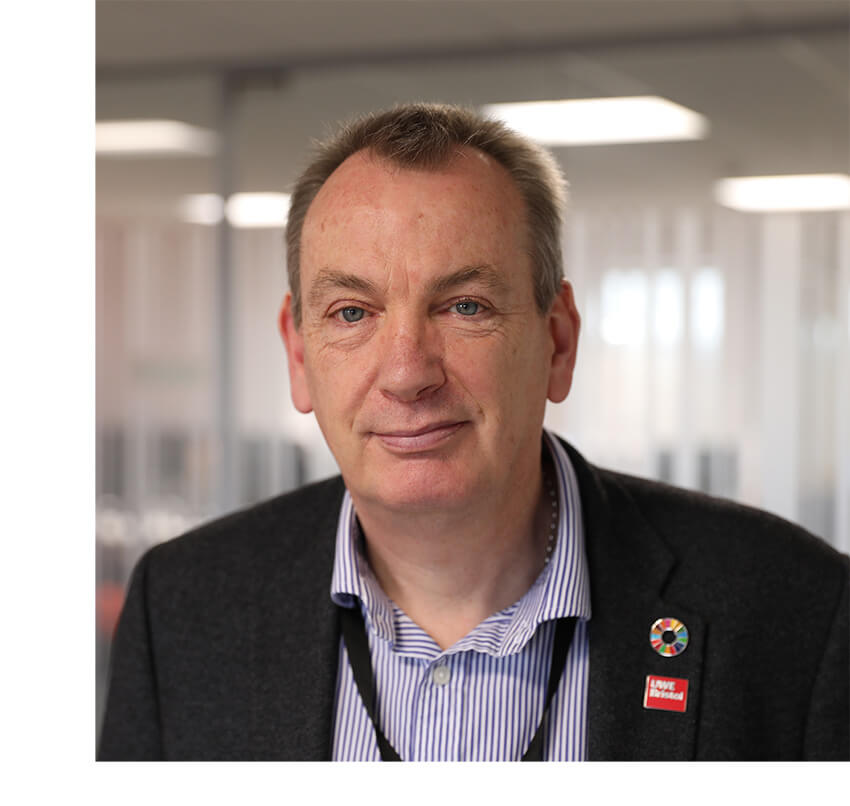Professor James Longhurst, Professor of Environmental Science and Assistant Vice Chancellor for Environment and Sustainability at UWE, Bristol, has spent over 35 years researching air and carbon management and urban sustainability.
Also currently serving as Company Director and Chair of the EAUC Board of Directors, Co-Chair of the Bristol Advisory Committee on Climate Change, Vice President of the Institution of Environmental Sciences and Director of Bristol Green Capital Partnership; As part of our focus on Responsible Leaders, Professor James Longhurst recently discussed why sustainability matters in the higher education sector with Peter Viqueria, Partner in the Education Practice.
“Many things on which your future health and prosperity depend are in dire jeopardy: climate stability, the resilience and productivity of natural systems, the beauty of the natural world, and biological diversity.’’
“It is worth noting that this is not the work of ignorant people. It is, rather, largely the result of work by people with BAs, BScs, LLBs, MBAs, and PhDs.”
David Orr (1991) What is Education for?
Society faces a set of profound sustainability challenges – a grossly unequal global society, an industrial system in urgent need of de-carbonization, a rapid decline of biodiversity, an increasing problem of air pollution, and a global society living beyond planetary boundaries. These are the systemic realities of an unsustainable model of development. The UN Sustainable Development Goals represent society’s best hope for avoiding catastrophic change.
Higher Education must and will play a leading role in plotting the route to a sustainable future and guiding society’s adaptation to living sustainably within the limits of the planet.
We are in the midst of a climate and environmental emergency where the capability of the planet to support our demands upon it is increasingly problematic. Current and future students understand this and expect their institution to act.
How will the higher education sector drive sustainability?
Higher education can be a powerful vehicle for sustainable development but much of higher education creates graduates who perpetuate current models of unsustainable behaviors and damaging environmental impacts. Of course, sustainability already matters for many higher education institutions but by no means all. Orr made his observations more than 30 years ago and in that period much has changed but for many institutions, the basic premise of Orr remains the same. Graduates are produced who have disciplinary knowledge but who lack the broader context of how that discipline impacts sustainability and lack awareness, skills or knowledge about how they can contribute to the development of a more sustainable future.
Higher education has a significant role to play in guiding society towards a sustainable future through research, community engagement and by developing the knowledge, skills and attributes of students so that they are aware of the ecological and climate crises. Education enables students to take responsibility for their lifestyles and can nurture a healthy human–nature relationship. Some but by no means all institutions have recognized the adverse impacts that their approach to higher education creates. Many more of the higher education providers in the UK need to consider how their curriculum, research, estate management, and community engagement actions can contribute to the creation of a more sustainable society. A society that universities, with their scale of resource and potential for positive impact across all 17 of the UN Sustainable Development Goals, are well placed to support on a sustainable development pathway. Higher education not only is capable of supporting a sustainable future; I would argue it has a moral responsibility to its students, future graduates and to their locality to exercise sustainability leadership. Higher education institutions, no matter their size, capacities, and capabilities need to engage strategically and operationally across all domains of activity, not as a 'nice to have' but as a core business organizing purpose.
How can the higher education sector have the most impact on sustainable practices?
By virtue of its size, distribution across the nation space, and through its financial resources, the higher education sector is uniquely placed to advance sustainability. In 2021–2022, there were 2,182,560 students studying at UK higher education providers and institutions and employ 233,930 staff, some 3.6% of the UK population. Not only does the sector have scale, but it also has a substantial financial resource with a combined annual income of £43.9 billion. The UK university sector contributed £52 billion to GDP and supported more than 815,000 jobs across England. It is interesting to speculate what more could be done with this scale and resource to support the development of a sustainable future.
Indeed, universities already produce large amounts of information to show how they are contributing to such a future. Many higher education institutions now produce a range of policy, strategy and annual reporting addressing sustainability. Universities UK report that 96% of their member universities have a clear, publicly available strategy to reduce carbon emissions and 97% have sustainability information openly available on their website.
However, it is questionable as to whether the necessary step of placing sustainability as a central consideration in the institutional decision-making process has been achieved.
Yet this is precisely what is needed if the higher education system is to move itself away from perpetuating an unsustainable set of social and economic relations that contribute to exceedances of planetary boundaries and embed gross global inequalities.
Critical to that change is developing curricula that embed the ideas of Education for Sustainable Development (ESD) into taught programs. ESD equips learners across all disciplines with the knowledge, skills, attributes and values required to pursue sustainable visions of the future and address complex problems. ESD allows students to identify how they can contribute to solutions that address environmental and social justice issues.
Universities should design their educational offer so that ESD is present in all programs of study.
If international students studying in the UK have, as part of their study experience, the opportunity to develop their understanding of sustainability then this might be seen as an acceptable trade for the environmental impact of their travel. Unfortunately, very few institutions embed ESD into all programs of study.
How can higher education equip students to approach sustainability?
Achieving the sustainable development goals, reversing biodiversity loss and reaching net zero emissions is essential, it is feasible, and as a sector dedicated to knowledge and thought leadership, it is rightfully expected. Students are acutely aware that they will live their lives as the climate and ecological crises play out. Actuarial life tables tell us that a student leaving a UK university this year can expect to live at least another 60 years. A life course in which they will experience wide-ranging, adverse climate and ecological changes.
Students rightly ask how their educational experience will prepare them for the challenges that they will encounter in their professional and private lives, a future that will not be business as usual.
Thanks to the long-running sustainability skills surveys conducted by SOS over more than a decade, we know that there is significant student concern about these matters. The Times Higher Education pulse survey indicated that 82% of students wanted to live in a way that was consistent with sustainable citizenship. Respondents wanted their institution to demonstrate how they are making progress against the UN's Sustainable Development Goals across education and research and for their institution to exhibit good practices in their civic engagement. Numerous surveys (e.g. Zurich Insurance) tell us that future cohorts of students will be much more concerned about the climate and ecological emergency. They will expect their institution to take the climate and ecological emergency seriously, to manage their estate wisely to include carbon literacy/climate education within the formal and informal curriculum and to prepare them for the challenges they will face across their life course, professional and private, as they live through a changing climate.
Current and future graduates will inherit the changing climate of tomorrow. We have a responsibility to prepare them for that future whilst doing everything we can to mitigate future emissions and to prepare and adapt for the unavoidable changes that are to come. The Higher Education sector has many good examples to draw upon from mitigation and adaptation to curriculum developments, research, and civic engagement but it is not widespread nor core business. Until it is, the higher education sector cannot claim to be preparing its students for the changing climate of the 21st Century.
Institution leaders will need to understand the challenges of an increasingly unsustainable world and appreciate the deeply held concerns of students for action. They will need to respond by developing and implementing the changes needed across all domains of activity so that higher education can play its proper part in developing a sustainable future.
What sources of advice are there for sustainable practices in Higher Education?
EAUC, the Alliance for Sustainability Leadership exists to lead and empower the post-16 education sector to make sustainability 'just good business'. Provides advice, guidance, tools, and communities of practice and runs the International and the UK and Ireland Green Gown Awards. https://www.eauc.org.uk/
Sustainability Leadership Scorecard. A tool to measure the sustainability performance of an institution. https://www.eauc.org.uk/sustainability_leadership_scorecard
SDG Accord. Advancing the critical role that education has in delivering the Sustainable Development Goals (SDGs) and sharing learning nationally and internationally. https://www.sdgaccord.org/
ESD Guidance. Sector-wide guidance developed by a team of academics and published by the Quality Assurance Agency and Advance HE. https://www.advance-he.ac.uk/teaching-and-learning/education-sustainable-development-higher-education#guidance
SOS Skills Survey. More than a decade of surveys reporting student attitudes towards learning for sustainable development. https://www.sos-uk.org/research/sustainability-skills-survey
Climate Action Toolkit. This toolkit covers mitigation and adaptation measures as well as broader sustainability considerations and is structured under five broad headings – Leadership and Governance, Campus Management, Teaching, Research and Community Engagement. https://www.eauc.org.uk/climate_action_toolkit
Responsible Futures. A change program and accreditation mark from SOS to embed sustainability across all aspects of student learning. https://www.sos-uk.org/project/responsible-futures

 With special thanks to Professor James Longhurst, Professor of Environmental Science and Assistant Vice Chancellor for Environment and Sustainability at the University of the West of England, Bristol.
With special thanks to Professor James Longhurst, Professor of Environmental Science and Assistant Vice Chancellor for Environment and Sustainability at the University of the West of England, Bristol.
To discuss sustainability in higher education further, contact Peter Viqueira, or get in touch with us here. You can also find your local Odgers Berndtson contact here.
Stay up to date: Sign up here for our global newsletter OBSERVE, and receive the latest news in leadership and top talent, industry insights, and events directly to your inbox.



